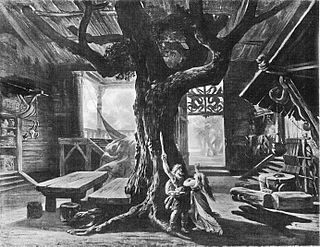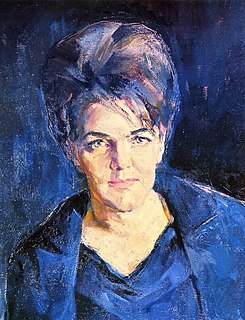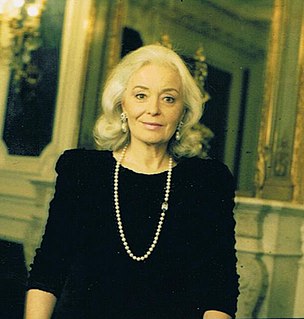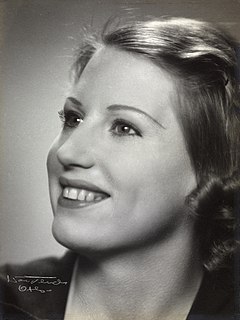
Die Walküre, WWV 86B is the second of the four music dramas that constitute Richard Wagner's Der Ring des Nibelungen,. It was performed, as a single opera, at the National Theatre Munich on 26 June 1870, and received its first performance as part of the Ring cycle at the Bayreuth Festspielhaus on 14 August 1876.

The "Ride of the Valkyries" refers to the beginning of act 3 of Die Walküre, the second of the four operas constituting Richard Wagner's Der Ring des Nibelungen.

Leopoldine Rysanek was an Austrian dramatic soprano.
Cheryl Studer is an American dramatic soprano who has sung at many of the world's foremost opera houses. Studer has performed more than eighty roles ranging from the dramatic repertoire to roles more commonly associated with lyric sopranos and coloratura sopranos, and, in her late stage, mezzo-sopranos. She is particularly known for her interpretations of the works of Richard Strauss and Richard Wagner.

Dame Gwyneth Jones, is a Welsh operatic dramatic soprano.

Johanna Jachmann-Wagner or Johanna Wagner was a mezzo-soprano singer, tragédienne in theatrical drama, and teacher of singing and theatrical performance who won great distinction in Europe during the third quarter of the 19th century. She was a niece of the composer Richard Wagner and was the original performer, and in some respects the inspiration, of the character of Elisabeth in Tannhäuser. She was also the original intended performer of Brünnhilde in Der Ring des Nibelungen, but in the event assumed other roles.

Amalie Materna was an Austrian operatic soprano. While possessing a famously powerful voice, Materna also maintained a youthful bright vocal timbre throughout her career which spanned three decades. She is best remembered today for originating several roles in operas by Richard Wagner.

Lucienne Bréval was a Swiss dramatic soprano who had a major international opera career from 1892-1918. Although she appeared throughout Europe and in the United States, Bréval spent most of her career performing with the Paris Opera where she became a greatly admired interpreter of French grand opera roles and Wagner heroines. She also specialized in the works of Gluck and Rameau, becoming particularly associated with the title roles in Gluck’s Armide and Rameau's Hippolyte et Aricie. A favorite of the composers of her day, such as Massenet and Dukas, Bréval sang in numerous world premières during her career.

Jean Madeira, née Jean Browning was an American contralto, particularly known for her work in late-romantic German repertoire such as the operas of Richard Wagner and Richard Strauss.

Mathilde Mallinger was a famous Croatian lyric soprano opera singer.
Therese (Thoma) Vogl was a German operatic soprano, the first Wellgunde in Wagner's Das Rheingold, and the first Sieglinde in his Die Walküre.

Sophie Stehle was a German operatic soprano.
Anna Kaufmann was a German operatic soprano who was a principal artist at the Bavarian State Opera in Munich from 1869 to 1872. Just prior to her appointment, the great soprano Mathilde Mallinger had left the Bavarian State Opera and Kaufmann succeeded her in the roles of Elsa in Richard Wagner's Lohengrin, Elisabeth in Wagner's Tannhäuser, and Eva in Wagner's Die Meistersinger von Nürnberg among other parts. She notably created the roles of Woglinde in Wagner's Das Rheingold on September 22, 1869 and Fricka in Wagner's Die Walküre on June 26, 1869. Currently, no further biographical details about Kaufmann's life both before and after her time at the Bavarian State Opera have surfaced.
Emma Seehofer was a German operatic contralto who was a principal artist at the Bavarian State Opera in Munich from 1854 to 1887. She created the roles of Erda in Richard Wagner's Das Rheingold on 22 September 1869 and Schwertleite in Wagner's Die Walküre on 26 June 1870. She was also highly active as a concert singer. After retiring from the stage, she worked as a singing teacher in Munich. She died at Mannheim.
Anna Deinet was a German operatic soprano who had an active career during the latter half of the 19th century. She had a lengthy career at the Bavarian State Opera where she particularly excelled in coloratura soprano roles. She is best remembered today for portraying Brangäne in the world premiere of Richard Wagner's Tristan und Isolde in 1865 and Helmwige in the premiere of Wagner's Die Walküre in 1869.

Josephine Schefsky was a German opera singer who had an active career during the latter half of the 19th century. Possessing a powerful voice with a wide vocal range, she tackled roles from both the soprano and mezzo-soprano repertoires. She is best remembered today for portraying several roles in the first complete presentation of Richard Wagner's The Ring Cycle at the very first Bayreuth Festival in 1876.

Friederike Grün was a German operatic soprano who had an active career during the latter half of the 19th century. Possessing a powerful voice with a wide vocal range, she sang a broad repertoire that encompassed Italian, French, and German opera. High points from her stage repertoire included the title heroine in Vincenzo Bellini's Norma, Agathe in Carl Maria von Weber's Der Freischütz, Leonore in Fidelio, Rachel in Fromental Halévy's La Juive, and Valentine in Giacomo Meyerbeer's Les Huguenots. She is best remembered today for portraying several roles in the first complete presentation of Richard Wagner's The Ring Cycle at the very first Bayreuth Festival in 1876.

Karen-Marie Flagstad was a Norwegian soprano opera singer.

Marie Lehmann was a German operatic soprano. She had a coloratura soprano voice, but also appeared in Wagner operas, including the first complete performance of his Der Ring des Nibelungen at the inaugural Bayreuth Festival in 1876, playing one of the Rhinemaidens.
Ute Vinzing is a German operatic soprano who received the title Kammersängerin. She is known for dramatic roles by Richard Wagner and Richard Strauss, including Brünnhilde, Isolde, Ortrud, Kundry, Elektra and the Dyer's Wife, which she performed internationally.















